Mabinty’s math teacher says she’s quick to answer questions and tries to understand new material. Competitive, she sits in the front row of class. She loves to rub it in when she beats the top boys for the best grades in class. At fifteen, she just finished the 10th grade with her second SFSL scholarship.
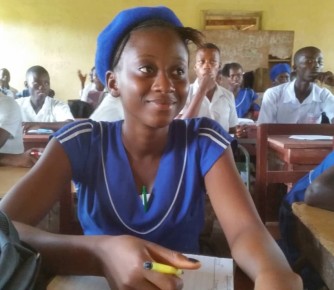
Mabinty is one of 460 Bumpeh Chiefdom girls waiting for her chance to return to school in September. You can give her that chance with a $30 Sherbro Foundation scholarship.
Mabinty doesn’t know her father who left the family soon after she was born. Her mother remarried and her stepfather raised her with three of her siblings and two other children.
School is important to Mabinty.
“When you get an education, you become someone in society,” she says. She wants to be a lawyer.
With a $30 scholarship, you give a girl much more than a year in school. With a new-found sense of self-worth, girls set goals for themselves and work hard to prepare for wage-paying jobs and real careers. They avoid pregnancy and early marriage that would end their dreams. They’re choosing careers that contribute to society and help develop their country.
Sherbro Foundation scholarships target the vulnerable Bumpeh Chiefdom children – orphans or those with single parents and the lowest income families struggling to send children to school. We strive to improve their their odds in the lottery of life.
The self-esteem that education brings will boost girls into promising futures. That sums up why we work so hard to send Sierra Leone girls to school. Education is the foundation for self-esteem in a country where the majority of women remain uneducated and often illiterate, treated as the lowest caste in society.

Salamatu, 17, in 9th grade, comes from a distant Bumpeh Chiefdom village. Her father died during Sierra Leone’s war, and her mother died soon after of an illness.
Salamatu’s aunt has raised her and her two siblings for the past 13 years. Her hard-working aunt is a trader, reselling things she buys in villages at Rotifunk’s weekly market – peppers, palm oil and charcoal.

With that income, her aunt cares for 10 children, eight in secondary school. This year will be Salamatu’s third on scholarship, which her aunt says are vital to keep her in school. At 17, many girls are force to drop out and start earning a living, often as market traders like Salamatu’s aunt
Salamatu wants to become a nurse “to serve mankind and for nation building.”
She’s one of 100 9th graders now in our partner CCET-SL’s study camp preparing for their senior high entrance exam in late July. After ten months of after-school tutoring classes and now the study camp (all SFSL funded), we expect the ranks of senior girls to grow in September. That’s our goal.
With your support, we’ve grown every year. In 2018-19, 170 senior girls were awarded scholarships; 460 secondary school girls in total. You can help more girls keep on their education journey to graduation and higher education for just $30 each.
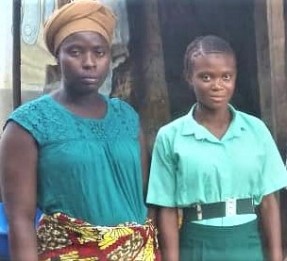 Aminata, 18, is finishing senior high with her third SFSL scholarship. Her stepmother cares for six children. Her meager earnings as a market trader helped Aminata complete school. They depended on SFSL scholarships to ease the growing cost burden on the struggling family.
Aminata, 18, is finishing senior high with her third SFSL scholarship. Her stepmother cares for six children. Her meager earnings as a market trader helped Aminata complete school. They depended on SFSL scholarships to ease the growing cost burden on the struggling family.
Aminata went to CCET-SL’s tutoring classes for senior high students preparing for their college entrance exam. A very small group of students has made it this far.
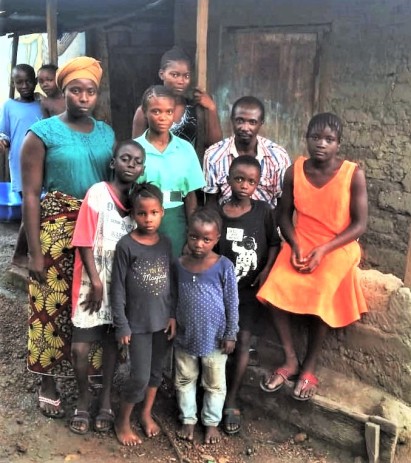 “The tutoring classes improved my studies,” Aminata said.
“The tutoring classes improved my studies,” Aminata said.
“But I wish there was a science laboratory because I want to become a medical doctor.”
We always have another goal to reach for!
Your $30 scholarship provides a full package. A girl gets a new school uniform – for many the only school clothes they may have for the year. Schools have no texbooks. We provide notebooks for students to copy notes teachers write on blackboards. These things cost more than the secondary school fees the Sierra Leone government is now paying for the first time.
This year we’re adding a washable and reusable menstrual hygiene kit that gives girls the freedom to attend school every day of the month. It gives girls the confidence to fully participate in school, like writing on blackboards, standing in front of class or at lunchbreaks, and participating in sports without the shame of exposing stained clothes.
Your scholarship provides so much for a girl. That’s all it takes to relieve subsistence-level families of the major financial burden to send their girls to school – and keep them in school until graduation.
Click here and send a Bumpeh Chiefdom girl to school with a scholarship. It feels great.
Thank you!
— Arlene Golembiewski
P.S. Your gift includes another intangible treasure: building a girl’s confidence that she can excel in school and in life. That’s priceless.
P.P.S. You can help more. Pass this on to a friend.
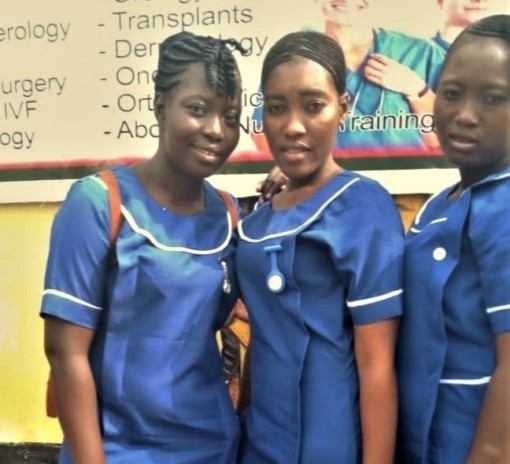 The three Rotifunk graduates are among the first Bumpeh Chiefdom girls to finish high school in more than 20 years since Sierra Leone’s war.
The three Rotifunk graduates are among the first Bumpeh Chiefdom girls to finish high school in more than 20 years since Sierra Leone’s war. 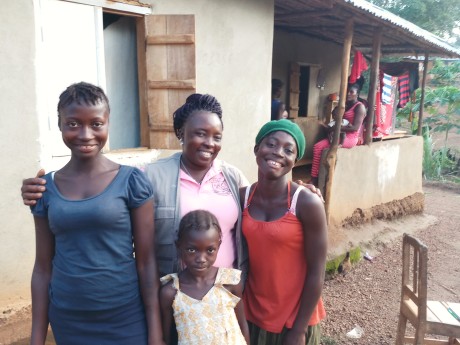 Rotifunk’s education godmother
Rotifunk’s education godmother  Community health nursing is a great entry point for young women like Fatmata, Umu and Safi. Nurses like Adama, above, run small village-based Public Health Units, where they treat common infectious disease like malaria and dysentery, stitch wounds and perform other first aid. They give women basic pre and post-natal care, serve as midwives at birth and offer well-baby care, including checking infants for stunting.
Community health nursing is a great entry point for young women like Fatmata, Umu and Safi. Nurses like Adama, above, run small village-based Public Health Units, where they treat common infectious disease like malaria and dysentery, stitch wounds and perform other first aid. They give women basic pre and post-natal care, serve as midwives at birth and offer well-baby care, including checking infants for stunting. 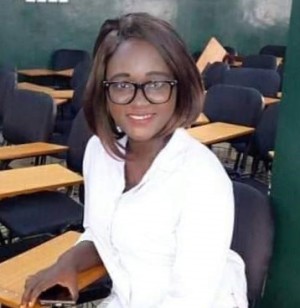


 Safi Bendu comes from a small village “downriver” some distance from Rotifunk. She had to leave home to go to secondary school.
Safi Bendu comes from a small village “downriver” some distance from Rotifunk. She had to leave home to go to secondary school.  But we forgot one important barrier to girls regularly attending school.
But we forgot one important barrier to girls regularly attending school.  Schools at best have a few latrines. Some schools don’t have on-site water – there’s no well or the pump doesn’t work. Forget sinks or wash stations at the latrines.
Schools at best have a few latrines. Some schools don’t have on-site water – there’s no well or the pump doesn’t work. Forget sinks or wash stations at the latrines. Every girl will get a kit in a colorful bag with 2 washable shields, 8 washable pads of an absorbent flannel type material and zip lock bags to hold soiled pads.
Every girl will get a kit in a colorful bag with 2 washable shields, 8 washable pads of an absorbent flannel type material and zip lock bags to hold soiled pads. If you have Netflix, you’ll want to see the 2019 Oscar winner for short documentary,
If you have Netflix, you’ll want to see the 2019 Oscar winner for short documentary,  Through their own fundraising, Schools for Salone offered us a steep discount on the kits. They know Sherbro Foundation has a successful grassroots program that will ensure the kits get to the kind of rural Sierra Leone girls we both work to serve.
Through their own fundraising, Schools for Salone offered us a steep discount on the kits. They know Sherbro Foundation has a successful grassroots program that will ensure the kits get to the kind of rural Sierra Leone girls we both work to serve.
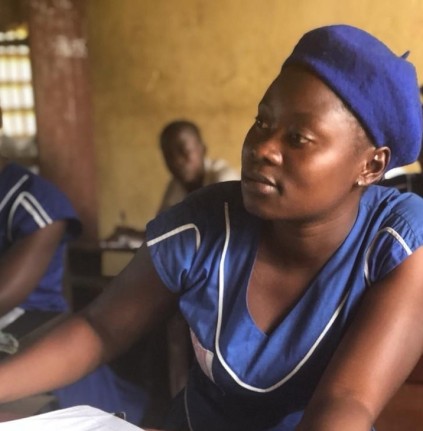 Educating girls is one the highest impact things we can do to lift women and their communities out of poverty.
Educating girls is one the highest impact things we can do to lift women and their communities out of poverty.  When I first saw Humu’s photo I thought, there’s a tall, slender, poised girl. A 16-year-old often shoots up in height, thin until she fills out. But I found there are other reasons why Humu is so slender.
When I first saw Humu’s photo I thought, there’s a tall, slender, poised girl. A 16-year-old often shoots up in height, thin until she fills out. But I found there are other reasons why Humu is so slender. Humu attends our partner CCET-SL’s after-school tutoring program, left, also funded by Sherbro Foundation, that prepares girls for their senior high entrance exam.
Humu attends our partner CCET-SL’s after-school tutoring program, left, also funded by Sherbro Foundation, that prepares girls for their senior high entrance exam.  I was concerned for Humu’s safety walking this distance alone in the dark. I was relieved to hear she walks with several other Mokebbie village students.
I was concerned for Humu’s safety walking this distance alone in the dark. I was relieved to hear she walks with several other Mokebbie village students.  Humu wants to move out of the endless cycle of poverty that’s trapped her family for generations. Her grandparents care for ten children in their three-room mud brick house. With a total of sixteen in their household, it’s packed at night with children sleeping on straw floor mats. Subsistence farmers, her family grows most of what they eat and barters much of what’s left. That leaves little cash to pay school expenses. They sent their deep thanks for the scholarships that have enabled Humu to stay in school.
Humu wants to move out of the endless cycle of poverty that’s trapped her family for generations. Her grandparents care for ten children in their three-room mud brick house. With a total of sixteen in their household, it’s packed at night with children sleeping on straw floor mats. Subsistence farmers, her family grows most of what they eat and barters much of what’s left. That leaves little cash to pay school expenses. They sent their deep thanks for the scholarships that have enabled Humu to stay in school. This year’s $30 scholarship package includes a wonderful addition to the school uniform and notebooks we supplied last year. All girls will get a
This year’s $30 scholarship package includes a wonderful addition to the school uniform and notebooks we supplied last year. All girls will get a 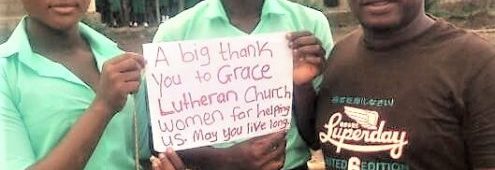
 Sherbro Foundation knows no one in Auburn, Maine. But someone there had hosted an exchange student from Sierra Leone. During the 2014 Ebola epidemic, they wanted to help at the grassroots level where they felt their money would be put to good use directly helping a rural Sierra Leone community. They found us on a Google search and have been giving ever since.
Sherbro Foundation knows no one in Auburn, Maine. But someone there had hosted an exchange student from Sierra Leone. During the 2014 Ebola epidemic, they wanted to help at the grassroots level where they felt their money would be put to good use directly helping a rural Sierra Leone community. They found us on a Google search and have been giving ever since.  “If we could raise fruit trees on a big enough scale, we could grow our own community’s future.”
“If we could raise fruit trees on a big enough scale, we could grow our own community’s future.” 700 coconut trees are flourishing in the first Rotary funded orchard, as well as lime, grapefruit, African plum, avocado, guava, soursop, oil palm and cassava. Most were grown in CCET’s tree nursery from local fruit seed.
700 coconut trees are flourishing in the first Rotary funded orchard, as well as lime, grapefruit, African plum, avocado, guava, soursop, oil palm and cassava. Most were grown in CCET’s tree nursery from local fruit seed. Chief Caulker, center, and Rosaline Kaimbay, CCET Managing Director, right, accept the Rotary Club of Ann Arbor flag from Mary Avrakotos. Dale Smith, Wilmington, NC Rotary Club, left, led fundraising for the medical care component of the grant.
Chief Caulker, center, and Rosaline Kaimbay, CCET Managing Director, right, accept the Rotary Club of Ann Arbor flag from Mary Avrakotos. Dale Smith, Wilmington, NC Rotary Club, left, led fundraising for the medical care component of the grant.
 Full-time orchard workers display their protective gear purchased from the Rotary grant: rain suits for working in the rainy season and thick rubber boots for protection against injury and snakes.
Full-time orchard workers display their protective gear purchased from the Rotary grant: rain suits for working in the rainy season and thick rubber boots for protection against injury and snakes. Local women are hired as part-time workers where heavy labor is not needed. These are planting peanuts in an orchard to generate annual operating income. They’re paid wages equal to those of part-time male workers.
Local women are hired as part-time workers where heavy labor is not needed. These are planting peanuts in an orchard to generate annual operating income. They’re paid wages equal to those of part-time male workers.
 School sports meets are a huge deal across Sierra Leone, but especially in rural towns like Rotifunk with little to entertain and amuse. Students march onto the sports field in brightly colored T-shirts for their house’s color, while a DJ blasts out music with massive speakers (thanks to a generator for power).
School sports meets are a huge deal across Sierra Leone, but especially in rural towns like Rotifunk with little to entertain and amuse. Students march onto the sports field in brightly colored T-shirts for their house’s color, while a DJ blasts out music with massive speakers (thanks to a generator for power).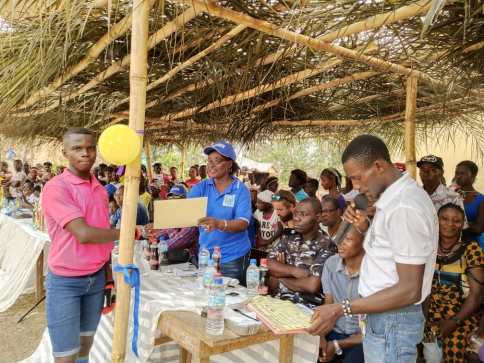 Announcers calls out the competitors in their various track & field events and give the volleyball play-by-play account. Winners in individual events get certificates. Houses will parade around town with trophies boasting of their overall meet results.
Announcers calls out the competitors in their various track & field events and give the volleyball play-by-play account. Winners in individual events get certificates. Houses will parade around town with trophies boasting of their overall meet results. My colleagues from our partner CCET-SL turned out to support Arlene’s house. Each house comes with its own masked “devil,” a nod to their traditional societies. These devils compete in a wildly gyrating dance competition where spectators vote by tossing money in their basket.
My colleagues from our partner CCET-SL turned out to support Arlene’s house. Each house comes with its own masked “devil,” a nod to their traditional societies. These devils compete in a wildly gyrating dance competition where spectators vote by tossing money in their basket.


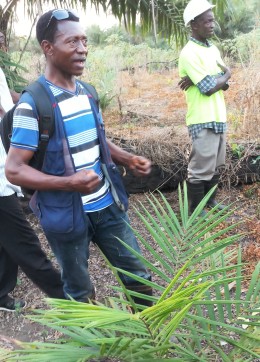 Our goal is for the orchards to produce annual income to run CCET’s education programs. In the meantime, we need annual crops to fund orchard operations until fruit trees mature and begin producing a few years from now.
Our goal is for the orchards to produce annual income to run CCET’s education programs. In the meantime, we need annual crops to fund orchard operations until fruit trees mature and begin producing a few years from now.








 The women were happy to receive wages for their labor.
The women were happy to receive wages for their labor.



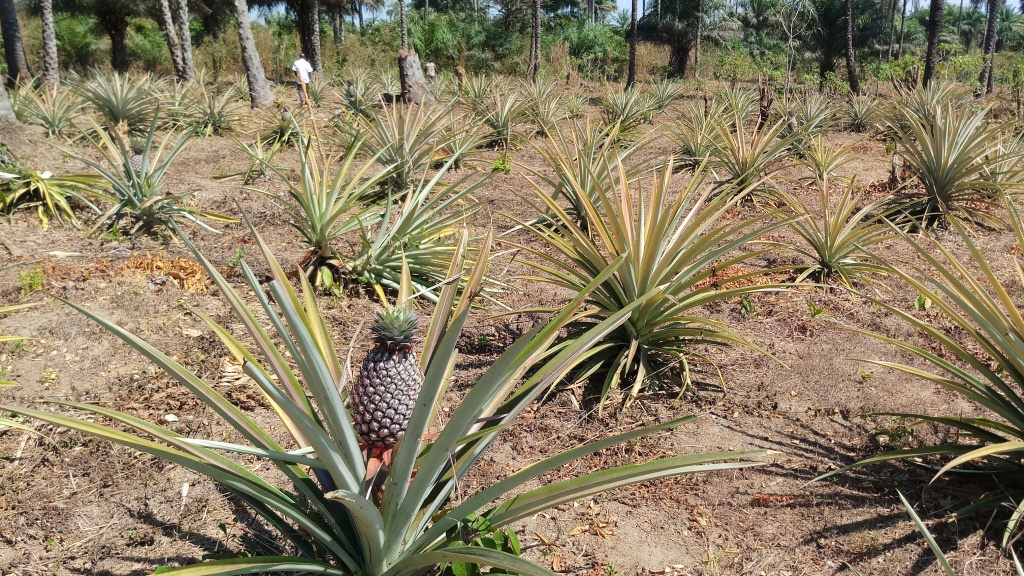
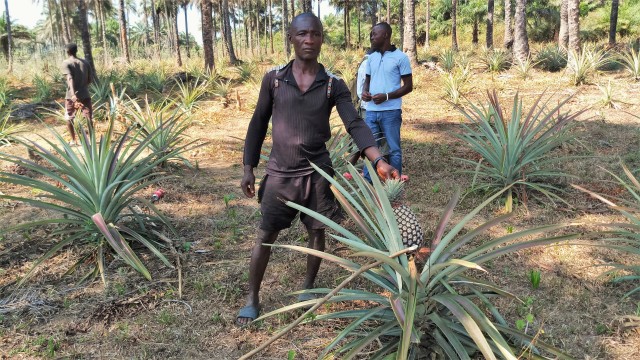
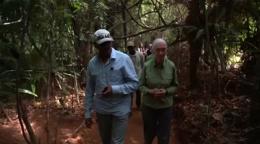 Goodall returned to the
Goodall returned to the 
 Girls in CCET’s tutoring program waiting to start their senior-high entrance exam.
Girls in CCET’s tutoring program waiting to start their senior-high entrance exam. Why the title Eat. Pray. Learn?
Why the title Eat. Pray. Learn?
 And prayer in all faiths, left, is part of the camp day. At day’s end, tables were pushed to the side and girls spread out on the floor to sleep dormitory style.
And prayer in all faiths, left, is part of the camp day. At day’s end, tables were pushed to the side and girls spread out on the floor to sleep dormitory style.
 We especially want to congratulate Bumpeh Academy who had the highest exam results (all students, boys and girls) among schools in 3 adjoining chiefdoms.
We especially want to congratulate Bumpeh Academy who had the highest exam results (all students, boys and girls) among schools in 3 adjoining chiefdoms.